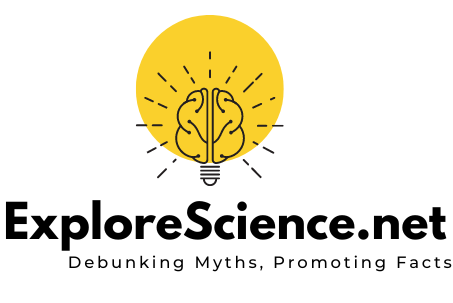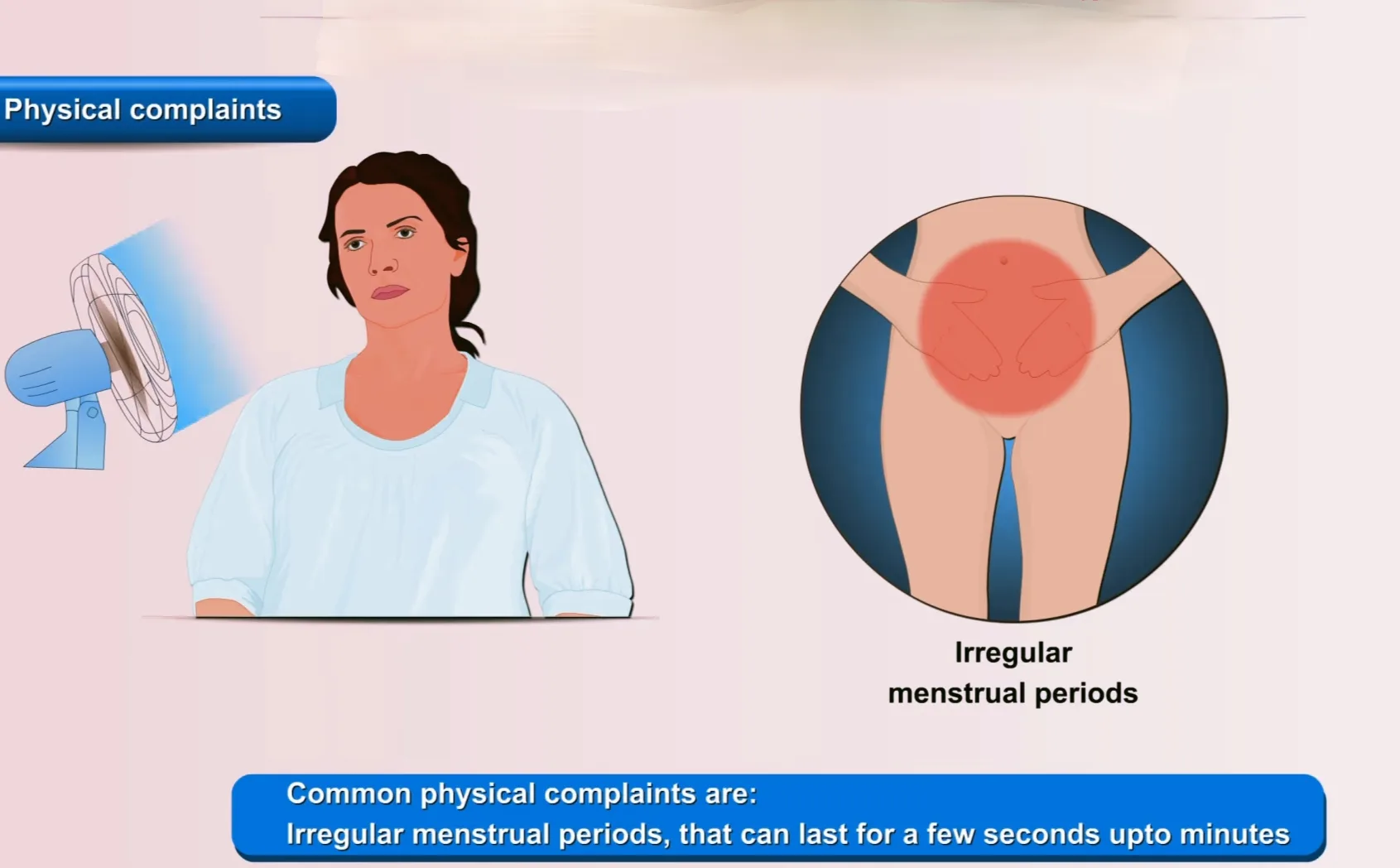Introduction:The menstrual cycle of a woman ends with the menopause, a normal biological process. Usually taking place in their late 40s to early 50s, women go through a variety of mental and physical changes throughout this time. On the other hand, early menopause refers to the situation when some women experience menopause earlier than anticipated.Premature menopause, sometimes known as early menopause or premature ovarian insufficiency (POI), can occur before to the age of forty. Signs of early menopause must be identified in order to receive timely medical attention and therapy. The following are typical indicators to be aware of:
IrregularPeriods:
An irregular menstrual cycle is one of the main signs of early menopause. This can include periods that flow heavier or lighter than usual, happen more frequently or less frequently than usual, or even occur without a period at all.
Hot Flashes: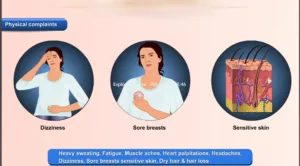
Often accompanied by perspiration and palpitations, hot flashes are unexpected, powerful heat waves that can go throughout the body. Even though they are frequently linked to menopause, they may indicate early menopause if they occur earlier in life.
Vaginal Dryness: During the menopause, decreasing estrogen levels can cause vaginal dryness and discomfort during sexual activity. This symptom can also be present in women going through an early menopause.
Some other main signs of early menopause:
The other main signs of early menopause are .most of the females these signs usually occurs at the age 45 years are above .
Sleep disturbances: Women going through menopause frequently complain of insomnia or irregular sleep patterns. These problems might be made worse by early menopause, which can result in weariness and persistent sleep disruptions. the urge for sexual activity, can also be affected by hormonal fluctuations. Signs of early menopause that a women may experience a decline in their desire for sexual engagement. Lower estrogen levels can cause the skin to become more dry and wrinkled by reducing its suppleness and moisture content. In a similar vein, hair may thin and become more fragile.
Modifications to Urinary Function: Lower estrogen levels may cause modifications to the urinary tract, including incontinence or more frequent urination. These symptoms may be seen by women going through an early menopause, which may lower their quality of life.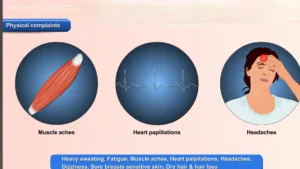
Cognitive Changes:
Some women who go through an early menopause may have cognitive changes, such as brain fog, memory loss, and difficulty focusing. Hormonal changes that occur during menopause are responsible for these changes.
Joint Pain: Estrogen helps to keep joints lubricated and healthy. Joint pain, stiffness, and discomfort during menopause, especially early menopause, can be caused by decreased estrogen levels.
Modifications to Breast Tissue: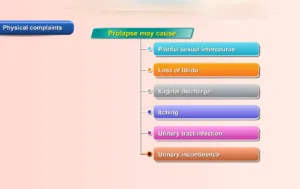
When estrogen levels drop, breast tissue may become less dense and more prone to textural changes. Women who go through early menopause may experience changes in their breasts’ sensation or appearance. Hormone fluctuations can occasionally result in palpitations or irregular heartbeats. Although there are many causes for palpitations, they may be the signs of early menopause menopause, particularly when they coexist with other menopausal symptoms.
Reasons of early menopause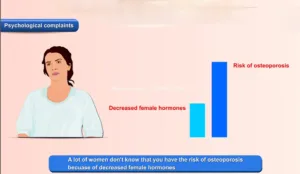
There are both hereditary and environmental variables that can lead to early menopause. The following are some typical causes of early menopause:
Genetic Factors:
Early menopause has been linked to an increased risk of having it in family history. Certain genetic diseases, such Fragile X syndrome or Turner syndrome, can also make women more susceptible to an early menopaus.A number of autoimmune conditions, including lupus, rheumatoid arthritis, and thyroid issues, can impair ovarian function and cause an early menopause.Surgical Intervention: Regardless of age, ovarian cancer or severe endometriosis can cause surgical removal of the ovaries (oophorectomy), which can cause menopause.
Chemotherapy and radiation therapy: These cancer therapies can cause ovarian tissue damage and ovarian function impairment, which can result in an early menopause.
Smoking:
Research has shown that women who smoke enter menopause earlier than non-smokers. Smoking can lower estrogen levels and hasten the loss of ovarian follicles.By disrupting ovarian function, exposure to specific environmental poisons, chemicals, or pollutants may cause an early menopause.Lifestyle Factors: A number of behaviors, including intense physical activity, high levels of stress, inadequate diet, and low body weight, might interfere with hormone levels and menstrual cycles, which may cause an early menopause.
Medical Conditions:
A number of illnesses, including diabetes and polycystic ovary syndrome (PCOS), can interfere with the regulation of hormones and ovarian function, which may raise the chance of an early menopause.It’s crucial to remember that while these variables may lead to an early menopause, not all women who have these risk factors will go through it. A combination of genetic, environmental, and behavioral factors continue to impact early menopause, making it a complicated and multifactorial phenomena.
How to overcome early menopause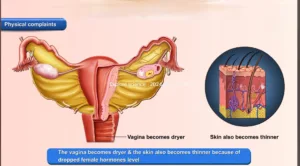
To control the symptoms and lessen the possible health concerns connected to an early menopause, there are therapies and interventions available.Hormone Replacement Therapy .To replace the body’s diminishing hormone levels, HRT patients take supplements of estrogen and occasionally progesterone. It can assist in easing symptoms such as mood swings, vaginal dryness, and hot flashes. But HRT might not be right for everyone and carries some dangers, so it’s important to talk to a healthcare professional about the possible advantages and disadvantages.
Fertility Preservation:
Before receiving treatments like chemotherapy or radiation therapy, women who wish to maintain their fertility may want to think about options like egg freezing or embryo preservation. These techniques, however, might not be practical for everyone, therefore speaking with a reproductive doctor is advised.
Changes in Lifestyle:
Leading a healthy lifestyle, which includes regular exercise, a balanced diet, stress reduction methods, abstaining from smoking and excessive alcohol usage, can help lessen the symptoms of early menopause and improve general wellbeing. To treat certain symptoms including mood swings, insomnia, or hot flashes, doctors may prescribe a variety of drugs and treatments, including antidepressants, selective serotonin reuptake inhibitors.
conclusion
Even while early menopause cannot be reversed, it can be controlled with a variety of therapies and lifestyle changes. Women navigating this transitional phase must recognize its signals, seek medical counsel, and apply appropriate interventions. Women experiencing early menopause can minimize symptoms and improve their general health and well-being by managing their condition proactively and receiving support.
